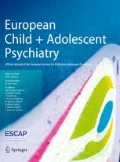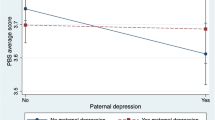Abstract
Maternal depression is associated with adverse child development, however little is known about paternal depression and child outcome. The aim of this study was to estimate the prevalence of paternal depression and assess its association with abnormal child behaviours among 4–6 year olds. Parents of 4–6 years olds were recruited via general practices and completed measures on child behaviour (Strengths and Difficulties Questionnaire), depression (Patient Health Questionnaire), and other covariates. The association of major and other paternal depressive syndrome with mother reported child behaviour was analysed. Eight percent (29/365) of fathers had depression (3.3 and 4.77% a major and other depressive syndrome, respectively). Major but not other paternal depressive syndrome was associated with an 8 and 36 times greater likelihood of child prosocial behaviour problems and peer problems respectively.
Similar content being viewed by others
References
Achenbach TM, McConaughy SH, Howell CT (1987) Child/adolescent behavioral and emotional problems: implications of cross-informant correlations for situational specificity. Psychol Bull 101:213–232
Amato PR, Rivera F (1999) Paternal involvement and children’s behavior problems. J Marriage Fam 61:375–384
Angst J, Gamma A, Gastpar M, Lepine JP, Mendlewicz J, Tylee A (2002) Gender differences in depression. Epidemiological findings from the European DEPRES I and II studies. Eur Arch Psychiatry Clin Neurosci 252:201–209
Ballard CG, Davis R, Cullen PC, Mohan RN, Dean C (1994) Prevalence of postnatal psychiatric morbidity in mothers and fathers. Br J Psychiatry 164:782–788
Barbor TF, de la Fuente JR, Saunders J, Grant M (1989) The alcohol use disorders identification test: guidelines for the use in primary health care. World Health Organisation, Geneva
Bigner JJ (1977) Attitudes toward fathering and father–child activity. Home Econ Res J 6:98–106
Black MM, Dubowitz H, Starr RHJ (1999) African American fathers in low income, urban families: development, behavior, and home environment of their three-year-old children. Child Dev 4:967–978
Brugha T, Bebbington P, Tennant C, Hurry J (1985) The list of threatening experiences: a subset of 12 life event categories with considerable long-term contextual threat. Psychol Med 15:189–194
Campbell SB (1995) Behavior problems in preschool children: a review of recent research. J Child Psychol Psychiatr 36:113–149
Caplan HL, Cogill SR, Alexandra H, Robson KM, Katz R, Kumar R (1989) Maternal depression and the emotional development of the child. Br J Psychiatry 154:818–822
Carro MG (1993) Postpartum depression and child development: an investigation of mothers and fathers as sources of risk and resilience. Dev Psychopathol 5:567–579
Chilcoat HD, Breslau N (1997) Does psychiatric history bias mothers’ reports? An application of a new analytic approach. J Am Acad Child Adolesc Psychiatry 36:971–979
Compas BE, Phares V, Banez GA, Howell DC (1991) Correlates of internalizing and externalizing behavior problems: perceived competence, causal attributions, and parental symptoms. J Abnorm Child Psychol 19:197–218
Craig TK, Bialas I, Hodson S, Cox AD (2004) Intergenerational transmission of somatization behaviour: 2. Observations of joint attention and bids for attention. Psychol Med 34:199–209
Cummings EM, Davies PT (1994) Maternal depression and child development. J Child Psychol Psychiatr 35:73–112
Dave S, Nazareth I, Sherr L, Senior R (2005) The Association of Paternal Mood and Infant Temperament: a pilot study. Br J Dev Psychol 23:609–621
Downey G, Coyne JC (1990) Children of depressed parents: an integrative review. Psychol Bull 108:50–76
Duhig AM, Renk K, Epstein MK, Phares V (2000) Interparental agreement on internalizing, externalizing, and total behavior problems: a meta-analysis. Clin Psychol Sci Pract 7:435–453
Edwards P, Roberts I, Clarke M, DiGuiseppi C, Pratap S, Wentz R, Kwan I (2002) Increasing response rates to postal questionnaires: systematic review. BMJ 324:1183
Eisenberg N, Fabes RA, Spinrad TL (2006) Prosocial behaviour. Eisenberg, N. social, emotional and personality development. 6th edn, (3), pp 646–718. Wiley, New York. Handbook of child psychology. Damon W, Lerner RM. Ref Type: Serial (Book, Monograph)
Flouri E (2005) Father’s involvement and psychological adjustment in Indian and White British Secondary School Age Children. Child Adolesc Ment Health 10:32–39
Goodman R (1997) The strength and difficulties questionnaire: a research note. J Child Psychol Psychiatr 38:581–586
Goodman R (2001) Psychometric properties of the strengths and difficulties questionnaire. J Am Acad Child Adolesc Psychiatry 40:1337–1345
Hagekull B, Bohlin G (1992) Prevalence studies of problematic behaviors in four-year-olds. Scand J Psychol 33:359–369
Hay DF, Payne A, Chadwick A (2004) Peer relations in childhood. J Child Psychol Psychiatr 45:84–108
Jacob T, Leonard KE (1986) Psychosocial functioning in children of alcoholic fathers, depressed fathers and control fathers. J Stud Alcohol 47:373–380
Jacob T, Johnson SL (1997) Parent–child interaction among depressed fathers and mothers: impact on child functioning. J Fam Psychol 11:391–409
Kane P, Garber J (2004) The relations among depression in fathers, children’s psychopathology, and father-child conflict: a meta-analysis. Clin Psychol Rev 24:339–360
Knafo A, Plomin R (2006) Parental discipline and affection and children’s prosocial behavior: genetic and environmental links. J Pers Soc Psychol 90:147–164
Koestner R, Franz C, Weinberger J (1990) The family origins of empathic concern: a 26-year longitudinal study. J Pers Soc Psychol 58:709–717
Kurstjens S, Wolke D (2001) Effects of maternal depression on cognitive development of children over the first 7 years of life. J Child Psychol Psychiatr 42:623–636
Laird RD, Pettit GS, Dodge KA, Bates JE (2005) Peer relationship antecedents of delinquent behavior in late adolescence: is there evidence of demographic group differences in developmental processes? Dev Psychopathol 17:127–144
Lamb MEE (1997) The role of the father in child development. Wiley, Chichester
Lewis C (1997) Fathers and preschoolers. In: Lamb MEE (ed) The role of the father in child development. 3rd edn. Wiley, Chichester, pp 121–142
Lewis C, Lamb ME (2003) Fathers’ influences on children’s development: the evidence from two-parent families. Eur J Psychol Educ 18:211–228
Loeber R, Hay D (1997) Key issues in the development of aggression and violence from childhood to early adulthood. Annu Rev Psychol 48:371–410
Lovejoy MC, Graczyk PA, O’Hare E, Neuman G (2000) Maternal depression and parenting behavior: a meta-analytic review. Clin Psychol Rev 20:561–592
Luoma I, Koivisto AM, Tamminen T (2004) Fathers’ and mothers’ perceptions of their child and maternal depressive symptoms. Nord J Psychiatry 58:205–211
MacDonald K, Parke RD (1984) Bridging the gap: parent–child play interaction and peer interactive competence. Child Dev 55:1265–1277
Mackey WC (1985) Fathering behaviors: the dynamics of the man–child bond. Plenum, New York
Marchand JF, Hock E (1998) The relation of problem behaviors in preschool children to depressive symptoms in mothers and fathers. J Genet Psychol Child Behav Anim Behav Comp Psychol 159:353–366
McBride BA, Mills G (1993) A comparison of mother and father involvement with their preschool age children. Early Child Res Q 8:457–477
Mitsis EM, McKay KE, Schulz KP, Newcorn JH, Halperin JM (2000) Parent–teacher concordance for DSM-IV attention-deficit/hyperactivity disorder in a clinic-referred sample. J Am Acad Child Adolesc Psychiatry 39:308–313
Murray L, Cooper P (1997) Postpartum depression and child development. Guilford, New York
Najman JM, Williams GM, Nikles J, Spence S, Bor W, O’Callaghan M, Le Brocque R, Andersen MJ (2000) Mothers’ mental illness and child behavior problems: cause–effect association or observation bias? J Am Acad Child Adolesc Psychiatry 39:592–602
Ohayon MM, Priest RG, Guilleminault C, Caulet M (1999) The prevalence of depressive disorders in the United Kingdom. Biol Psychiatry 45:300–307
Paquette D (2004) Theorizing the father–child relationship: mechanisms and developmental outcomes. Hum Dev 47:193–219
Parke RD (1996) Fatherhood. Harvard University Press, Cambridge
Parke R (2004) Fathering and children’s peer relationships. In: Lamb MEE (ed) The role of the father in child development. 4th edn. Wiley, NJ, pp 307–340
Penner LA, Finkelstein MA (1998) Dispositional and structural determinants of volunteerism. J Pers Soc Psychol 74:525–537
Phares V, Compas BE, Howell DC (1989) Perspectives on child behavior problems: comparisons of children’s self-reports with parent and teacher reports. Psychol Assess 1:68–71
Ramchandani P, Stein A, Evans J, O’Connor TG (2005) Paternal depression in the postnatal period and child development: a prospective population study. Lancet 365:2201–2205
Roopnarine JL, Mounts NS (1985) Mother–child and father–child play. Early Child Dev Care 20:157–169
Rutherford E, Mussen P (1968) Generosity in nursery school boys. Child Dev 39:754–765
Sandberg JF, Hofferth SL (2006) Changes in children’s time with parents: United States 1981–1997. Demography 38:436
Shannon JD, Tamis-LeMonda CS, London K, Cabrera N (2002) Beyond rough and tumble: low-income fathers’ interactions and children’s cognitive development at 24 months. Parenting: Sci Pract 2:77–104
Sherr L, Dave S, Lucas P, Senior R, Nazareth I (2006) A feasibility study on recruiting fathers of young children to examine the impact of paternal depression on child development. Child Psychiatry Hum Dev 36:295–309
Singleton N, Bumpstead R, O’Brien M, Lee A, Meltzer H (2001). Psychiatric morbidity among adults living in private households. National Statistics, vol 154. The Stationary Office, London. Ref Type: Report
Spanier GB (1976) Measuring dyadic adjustment: new scales for assessing the quality of marriage and similar dyads. J Marriage Fam 38:15–28
Spitzer RL, Kroenke K, Williams JB (1999) Validation and utility of a self-report version of PRIME-MD: the PHQ primary care study. Primary care evaluation of mental disorders. Patient health questionnaire. J Am Med Assoc 282:1737–1744
Tamis-LeMonda CS, Shannon JD, Cabrera NJ, Lamb ME (2004) Fathers and mothers at play with their 2- and 3-year-olds: contributions to language and cognitive development. Child Dev 75:1806–1820
Townsend P, Phillimore P, Beattie A (1988) Health and deprivation: inequality and the north. Croom Helm, London
Treutler CM, Epkins CC (2003) Are discrepancies among child, mother, and father reports on children’s behavior related to parents’ psychological symptoms and aspects of parent–child relationships? J Abnorm Child Psychol 31:13–27
Vandell DL (2000) Parents, peer groups, and other socializing influences. Dev Psychopathol 36:699–710
Webster-Stratton C (1988) Mothers’ and fathers’ perceptions of child deviance: roles of parent and child behaviors and parent adjustment. J Consult Clin Psychol 56:909–915
Whiffen VE, Gotlib IH (1989) Infants of postpartum depressed mothers: temperament and cognitive status. J Abnorm Psychol 98:274–279
Woodward LJ, Fergusson DM (2000) Childhood peer relationship problems and later risks of educational under-achievement and unemployment. J Child Psychol Psychiatr 41:191–201
Woollett A, White DG, Lyon ML (1982) Studies involving fathers: subject refusal, attrition and sampling bias. Curr Psychol Rev 2:193–212
Yogman MW, Kindlon D, Earls F (1995) Father involvement and cognitive/behavioral outcomes of preterm infants. J Am Acad Child Adolesc Psychiatry 34:58–66
Acknowledgements
The study was funded by the Royal College of General Practitioners and the North Central London Research Consortium (NoCLoR). We would like to thank the families involved and the general practices for their participation in the study.
Author information
Authors and Affiliations
Corresponding author
Rights and permissions
About this article
Cite this article
Davé, S., Sherr, L., Senior, R. et al. Associations between paternal depression and behaviour problems in children of 4–6 years. Eur Child Adolesc Psychiatry 17, 306–315 (2008). https://doi.org/10.1007/s00787-007-0672-6
Accepted:
Published:
Issue Date:
DOI: https://doi.org/10.1007/s00787-007-0672-6




